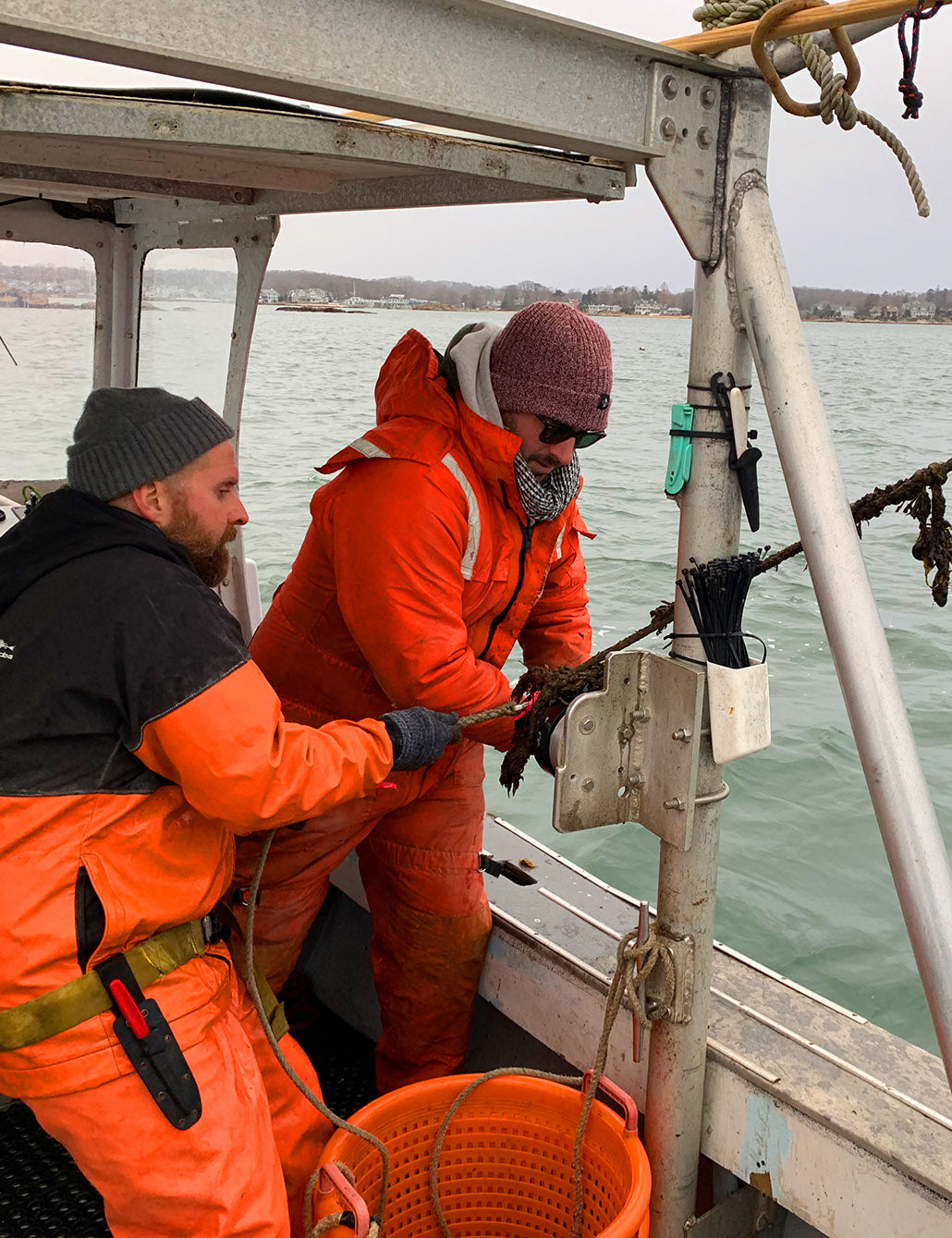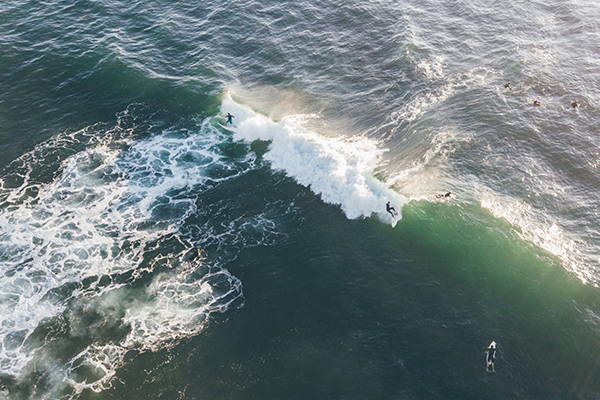By Andrew Iida l Head Writer and one-time jigsaw puzzle completer
It’s so much more than a hobby. Surfing has the potential to be a powerful transformative force in a person’s life, changing the way they view and interact with the world, which is why so many people treat it as a spiritual practice.
Start the day on the right foot
It’s 6:00 AM on a weekday in April of 2020. This time last year, you would have been reaching for the snooze button to stop the alarm clock’s horrible wailing. You’d struggle to lift yourself out of bed, back tight and sore from a night of restless sleep, and trudge your way to the kitchen for a hot mug of motivation. But coffee is never enough; you would have dressed yourself and driven to work in a groggy, aching haze. Never fully awake. Never fully alive.
All of that has changed since your New Year’s resolution. Now you’re sitting on a board, not lying in bed. You’re listening to the gentle crash of waves as they wash along the shore, not the incessant blaring of an alarm. You’re watching the sun just beginning to break over the horizon, filling the sky with a warm yellow glow. It reflects on the surface of the ocean, turning the blue waters into a sea of liquid gold, rippling around you. You’re completely at peace; everything is clear and sharp, as if someone lifted a gray veil that you didn’t realize had been obscuring your sight of the world. You’re ready. Not just for the next wave, but for whatever challenges life will conjure before you after you leave this ocean dreamland and go back to the real world. You are a surfer.

Surfing...spiritually?
It’s so much more than a hobby. Surfing has the potential to be a powerful transformative force in a person’s life, changing the way they view and interact with the world, which is why so many people treat it as a spiritual practice. For these people, it isn’t just surfing; it’s active meditation. You can find many articles and books which explore surfing as a Zen practice, and for good reason: surfing necessitates mindfulness, a core tenet of Buddhist meditation. The most widely-shared images of surfers are taken while they’re catching a wave, but in reality, riding a wave is just a small part of surfing. The rest of the time is spent paddling with a distinct, practiced form, or sitting on top of the board observing the ocean around you, carefully observing and feeling for the perfect moment to drop in.
The Buddhist monk Sheng Yen believed in the practice of active meditation with specific forms, stating, “such methods of exercise… are designed to harmonize the body and develop concentration in the midst of activity,” and surfing almost seems like it was designed to fulfil those goals. While riding a wave, the mind must be unified with the entire body, and must be fully immersed in the moment. It’s all about achieving the flow state, the state of mind in which you are completely absorbed in an activity, where all outside distractions fade away into the distance, and everything seems to happen automatically. This state is well known to top-level athletes—they call it “the zone”—at the peak of their careers, but for surfers, it seems to come more quickly and naturally. You’ll get it. Maybe not right away, but there will come a time when you’re sitting on your board that the perfect wave will come in, and you’ll move on autopilot from start to finish. You won’t even think about it; it will feel like it could have happened without you there. That’s flow. When it happens, you’ll know that you’ve achieved a state of mind that Zen monks strive for.

Surfing means staying healthy
But maybe you’re a pragmatist, and completely uninterested in Zen Buddhism or the spiritual side of surfing. Even ignoring all of that, taking up surfing can have a huge positive impact on your life. One of the most obvious benefits comes from surfing’s physical nature. Surfing is a whole-body activity that delivers a high-intensity, low-impact workout, so you’ll quickly find that your wetsuit is getting tighter in the shoulders and looser around the waist. If you’re one of the 80% of Americans who experience low back pain, surfing might provide you some relief. You need to use your core to balance on the board, and as your abdominal muscles strengthen, they will help to support your spine, which can alleviate pain.
And just sticking to an exercise routine—any routine—is important. The Center for Disease Control estimates that three fourths of Americans do not get enough exercise, increasing their risk for serious diseases, including obesity, high blood pressure, diabetes, strokes, and certain types of cancer. Regular exercise is also important for sleep, so if you’re one of the 50% of Americans with insomnia, surfing can help you fall asleep more quickly and deeply, and improve your overall sleep quality. If you commit to a healthier lifestyle with regular exercise, you’ll live longer, and your quality of life will be much higher throughout those extra years.

It can also keep you mentally healthy, which is increasingly important in the modern world. All over the country, rates of mental health issues are significantly increasing, particularly in young adults. Of course, if you are already struggling with a mental health issue, there’s no better option than to seek help from a trained professional. But for those lucky enough to be generally mentally healthy, surfing can help prevent mental disorders and improve overall moods. Exercise is often part of the prescribed treatment for mental illnesses, and although we aren’t quite sure exactly how it works (it’s thought that exercise may increase blood flow to the brain, creating positive physiological changes), we know that it’s effective. Multiple studies have demonstrated that exercise can significantly reduce anxiety, depression, and other symptoms of mental health issues.
And for mental health, surfing goes beyond physical exercise. Let's go back for a moment to the meditative aspects of surfing. Ignoring anything connected to spirituality and metaphysics, we know empirically that practicing mindfulness mindfulness exercises have been incorporated into cognitive behavior therapy, an effective treatment for mood disorders like depression and anxiety. Just sitting calmly on a board and focusing on your breathing a few times a week can help reduce stress and improve overall mood.
Considering the research-based evidence, it’s no surprise that surfing is becoming an official tool of mental health professionals. Groups like the International Surf Therapy Organization are working to connect researchers, organizations, and mental health professionals in an attempt to further the research into surfing as a therapy and promote the growth of the practice, and it’s picking up significant traction. After seeing success with surf therapy programs, the United States military launched a million dollar research project to gauge its efficacy. If the study is successful, service members who return from combat with PTSD will have more opportunities to surf as an official part of their treatment. All over the world, surfing is coming into prominence as a tool to change lives.

Surf for the culture
Aside from personal changes like improvements in mental health and physical fitness, surfing can also alter the way you interact with other people and the world. The surf community can be a bit cold towards newcomers, but if you learn the proper surf etiquette and keep practicing, you’ll find that surf culture can be positive and welcoming. You’ll have the opportunity to meet new people, explore locations you never would have known about, and find your place in a community full of like-minded individuals. Just go into it with a mindset of respect, both for other surfers (never drop in on someone riding a wave), and for the planet. Surfers, being in the ocean at every opportunity, tend to have a deep appreciation for the environment and a passion for conservation. Once you start spending a lot of time on the water, there’s a good chance you’ll begin to feel the same way, and seeing someone leave trash on the beach will seem like an unforgivable sin. Don’t be surprised when, in your quest to become a better person, you find yourself striving to create a better, cleaner world as well.
“I wish I hadn’t wasted all that time learning to surf,” is a sentence I’ve never heard anyone say. Try it out. Stick with it for a while, and even if it’s not for you, you’ll leave the experience with a better understanding of who you are and what you’re capable of. But maybe you’re like me, and surfing will resonate with something deep within you that you never knew existed, setting you on a path to living a better, deeper, more deliberate life.
It’s sunrise on January 1st, 2020. A wave rolls in, submerging bare feet that protrude from the bottom of your wetsuit. A chill rolls through your body, but you’re not sure if its from the rush of cool water or from the anticipation that’s been building inside of you. You run into the surf, lie down on your board, and paddle out into a new world.









